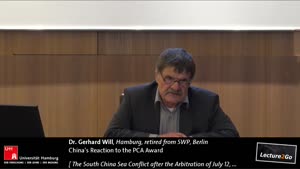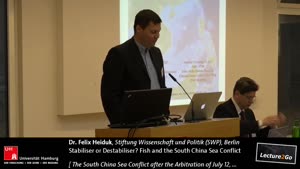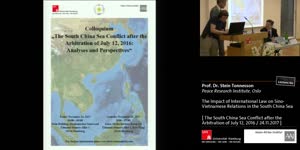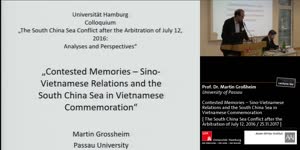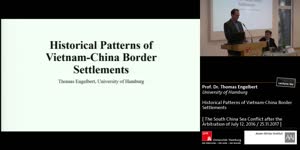Shifting Currents of Power in the South China Sea and a Helpful Lesson from Europe's Diplomatic History - Dr. Enrico Fels - Universität Hamburg
- Lecture2Go
- Videokatalog
- F.5 - Geisteswissenschaften
- Asien-Afrika-Institut
- The South China Sea Conflict after the Arbitration of July 12, 2016: Analyses and Perspectives
Videokatalog
Shifting Currents of Power in the South China Sea and a Helpful Lesson from Europe's Diplomatic History
More than a year after a finding of an international tribunal in The Hague, the disputes in the South
China Sea (SCS) no longer dominate the headlines of global media. However, as the rows themselves
are far from being solved, the situation continues to be unstable. A confident China that is equipped with
greater aggregated power than ever before during the last hundred years is not accepting an international
ruling and keeps on increasing its hold over the disputed areas in the SCS. The current situation is
essential conserved due to Chinese military and economic strength, rendering the disputes into a telling
example for the continuing reign of great power politics. The fact that a viable regional security
community is missing, adds to the seriousness of the situation. Unfortunately, next to Asia-Pacific’s
shifting aggregated power structure, Beijing’s rivalry with Washington and other powers for regional
influence further exacerbates the region’s looming ‘Thucydides Trap’ (Graham Allison).
While it seems that the SCS has been ‘lost’ to a dominant great power that is unwilling to compromise
and embrace an arbitration by an important international legal body that it sees as being detrimental to
its national interests, there is no substantial evidence that suggest that other major claimants and as well
as powerful non-claimants, most prominently the US, are openly supportive to Beijing’s position. Fear
of military conflict appears to drive their willingness to accept the Chinese position for the time being.
All in all, the SCS disputes have developed into a political powder keg, with current international law
looking to be (so far) unable to tackle great power politics and the dynamics they trigger in the SCS
(might vs. right).
Based on the understanding that a peaceful settlement of the disputes in the long-term can only be
achieved if not only regional power dynamics but also the continuing political endorsement of regional
great and middle powers can be found, a creative diplomatic solution is needed that helps to manage and
defuse the conflict by balancing national interests as best as possible. By drawing on the historic example
of the Spitsbergen Treaty, the presentation outlines a possible conflict management solution to the SCS
disputes based on a largely neglected part of Europe’s diplomatic history. Applying the ‘Spitsbergen
Approach’ to the SCS would help claimant and non-claimant states to permanently defuse the tense
situation, do justice to their national interests and both limit the likelihood of a ‘Chinese Monroe
Doctrine’ for the SCS and start a joint and less conflict-ridden usage of Asia’s most troubled water and
its great riches.



